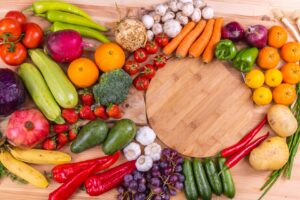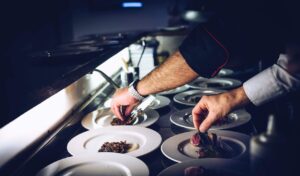Nutrition in AOD settings eLearning
Nutrition in AOD settings online learning
This online course is designed for AOD workers and clients who’d like some practical ideas for improving nutrition in AOD settings. We know that focusing on nutrition can seem less important when there are other priorities of recovery to contend with. However, good nutritional intake can contribute to better mood and less cravings for substances during periods of not using. Ultimately, the better you eat, the easier it is for your mind and body to recover! Always remember, this is a simple guide and doesn’t replace personalised nutrition advice from a professional.
This eLearning is divided into three parts (modules). The modules are interactive and contain embedded resources and other items you can activate to explore more information. Be sure to click around to get the most out of the modules!
Module one – Eating for recovery
20 minutes
Food affects more than physical health. It also affects the way we think and feel. This is why it’s such an important part of recovery. Just like the heart, stomach and liver, the brain is an organ that is directly sensitive to what we eat and drink. Importantly, foods contain the ‘ingredients’ to help our brain replace some of the chemicals that can become depleted when we use alcohol or other drugs.
What we eat affects our mood, the decisions we make, and the way we behave and interact with the world around us. This module provides an overview of foods we can expect to see in a balanced diet and aims to debunk some of the long running myths around fad diets!

Module two – Serving sizes, food labels, and food safety
20 minutes
Thinking about food in terms of ‘serves’ helps us to ensure that we have enough and not too much of each food group. However, sometimes it can be hard to decipher what the information on the labels really means. This module introduces the concept of ‘serves’ (portions) of each food group, highlights tricks to look out for on food labels, and provides some tips for handling, preparing, and storing food safely.

Module three – Eating on a budget
10 minutes
For many people the cost of food can be an added pressure making it more difficult to plan for and eat a balanced diet. This module aims to provide simple suggestions to achieve a balanced, recovery focused diet on a budget. We’ve also included a simple recovery focused cookbook with recipe ideas for breakfast, lunch, and dinner at the end of this course.

Please click the button below to start the eLearning
BeginResources
- Good Nutrition in AOD Recovery cookbook
- wanada.org.au (search for ‘nutrition’)
- www.qaihc.com.au (search for ‘catering’)
- adf.org.au/insights/healthy-eating-during-treatment
- eatforhealth.gov.au
- veggycation.com.au